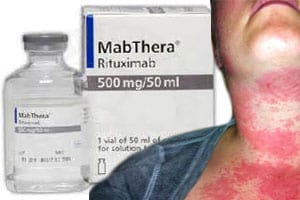
Roche Products Limited just issued a letter to healthcare providers in cooperation with the European Medicines Agency (EMA) and the Medicines and Healthcare products Regulatory Agency (MHRA) concerning the use of MabThera (rituximab) and severe skin reactions. According to Roche, cases of the severe skin reactions toxic epidermal necrolysis (TEN) and Stevens-Johnson Syndrome (SJS) were […]
 Roche Products Limited just issued a letter to healthcare providers in cooperation with the European Medicines Agency (EMA) and the Medicines and Healthcare products Regulatory Agency (MHRA) concerning the use of MabThera (rituximab) and severe skin reactions.
Roche Products Limited just issued a letter to healthcare providers in cooperation with the European Medicines Agency (EMA) and the Medicines and Healthcare products Regulatory Agency (MHRA) concerning the use of MabThera (rituximab) and severe skin reactions.
According to Roche, cases of the severe skin reactions toxic epidermal necrolysis (TEN) and Stevens-Johnson Syndrome (SJS) were reported in patients with the autoimmune disease, rheumatoid arthritis. This included one fatal case of TEN. Severe, bullous skin reactions, including fatal cases of TEN, were also reported in patients with certain blood cancers. This side effect is included in MabThera product information.
Roche urges that if severe skin reactions do occur in patients treated with MabThera, that treatment should be permanently discontinued. Cases of TEN and SJS in autoimmune patients have been reported in first-time use and in later infusions, with some cases taking place on the day of dosing or within a few days of dosing. In other cases, the reaction took place weeks, or up to four months after the dose.
Four TEN cases in patients diagnosed with the autoimmune disease, rheumatoid arthritis, occurred close to when MabThera treatment was initiated—on the day of dosing or the day following; one of these patients died. In some of the cases involving patients with autoimmune disorders, treatments known to be possibly associated with TEN and SJS were given concomitantly with MabThera therapy. The reason for the reactions remains unknown.
MabThera infusion contains the active ingredient rituximab, a monoclonal antibody that attacks white blood cells (B lymphocytes) and is used in the treatment of three diseases, two lymphatic system cancers—non-Hodgkins lymphomas and chronic lymphocytic leukemia—and rheumatoid arthritis, which is an inflammatory disease of the joints. The product information for MabThera is being updated to reflect the new safety information specifically involving use of the drug for treatment of these diseases.
Some medications may trigger a severe sensitivity reaction that can lead to very serious, fatal, responses, such as SJS and TEN. Patient advocates have long argued that current drug allergy alert label information on many over-the-counter medications does not contain sufficient user warnings about the risk of SJS. In the United States, prescription medications known to be associated with Steven-Johnson Syndrome often bear a black box warning, the U.S. Food & Drug Administration’s (FDA) most urgent warning.
SJS is a severe sensitivity reaction that causes blistering of the mucous membranes, which typically occurs in the mouth, eyes, and vagina, and can spread to internal organs; patchy areas of rash that eventually peel off the skin; scarring; and blindness. The most severe cases of SJS are referred to as TEN. When over 30 percent of the body is impacted, the condition becomes toxic epidermal necrolysis.
Both SJS and TEN typically call for hospital burn unit treatment.


